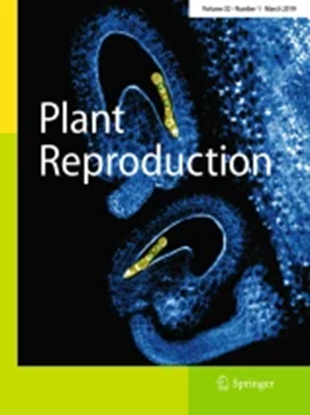Seedless fruit in Annona squamosa L. is monogenic and conferred by INO locus deletion in multiple accessions
IF 2.4
4区 生物学
Q2 PLANT SCIENCES
引用次数: 0
Abstract
Understanding the genetic basis and inheritance of a trait facilitates the planning of breeding and development programs of new cultivars. In the sugar apple tree (Annona squamosa L.), the mechanism of the desirable seedless trait in the Thai seedless (Ts) and Brazilian seedless (Bs) accessions was associated with a deletion of the INNER NO OUTER (INO) locus. Genetic analysis of F1, F2 and backcross descendants of crosses of Bs to fertile wild-type varieties showed that seedlessness was recessive and monogenic. Whole genome sequencing of a third accession, Hawaiian seedless (Hs), identified a 16 kilobase deletion including INO. The finding of an identical deletion in Ts and Bs indicated a common origin among genotypes, from a single deletion event. Analysis of microsatellite markers could not preclude the possibility that all three accessions are vegetatively propagated clones. The sequence of the deletion site enabled formulation of a codominant assay for the wild-type and mutant genes that validated the INO gene deletion as the cause of seedless trait, and can be used in the selection of new seedless varieties. The study findings and obtained progenies should be useful in breeding and introgression programs of the trait into elite sugar apple lines and into other Annonas by means of interspecific crossings.squamosa L.无籽果实是单基因的,是通过多份材料中INO位点缺失而获得的
了解一个性状的遗传基础和遗传特性有助于制定新品种的育种和开发计划。在糖苹果树(Annona squamosa L.)中,泰国无籽(Ts)和巴西无籽(Bs)材料中理想无籽性状的机制与INNER NO OUTER (INO)位点的缺失有关。对b与可育野生型品种杂交的F1、F2和回交后代的遗传分析表明,无籽是隐性的、单基因的。第三个品种夏威夷无籽(Hawaiian seedless, Hs)的全基因组测序发现了包含INO在内的16千碱基缺失。在t和b中发现相同的缺失,表明基因型之间有共同的起源,来自单一的缺失事件。微卫星标记分析不能排除这三个材料都是无性繁殖无性系的可能性。缺失位点的序列使野生型和突变型基因的共显性分析得以建立,验证了INO基因缺失是无籽性状的原因,并可用于无籽新品种的选择。研究结果和获得的后代对该性状的选育和通过种间杂交向优良的苹果株系和其他品种的渗透具有一定的指导意义。
本文章由计算机程序翻译,如有差异,请以英文原文为准。
求助全文
约1分钟内获得全文
求助全文
来源期刊

Plant Reproduction
PLANT SCIENCES-REPRODUCTIVE BIOLOGY
CiteScore
6.30
自引率
2.90%
发文量
19
期刊介绍:
Plant Reproduction (formerly known as Sexual Plant Reproduction) is a journal devoted to publishing high-quality research in the field of reproductive processes in plants. Article formats include original research papers, expert reviews, methods reports and opinion papers. Articles are selected based on significance for the field of plant reproduction, spanning from the induction of flowering to fruit development. Topics incl … show all
 求助内容:
求助内容: 应助结果提醒方式:
应助结果提醒方式:


